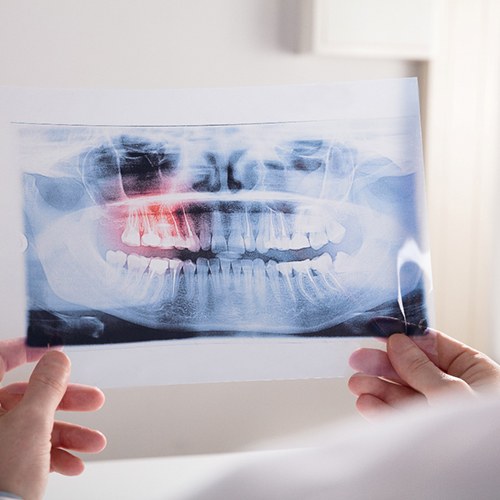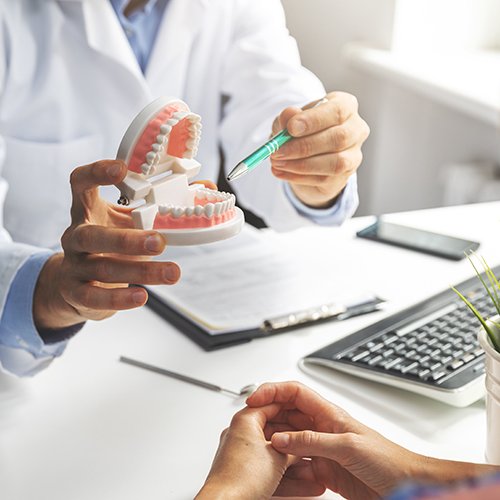

Most of your teeth are invaluable, but there are a few exceptions. Wisdom teeth are a great example because they often end up causing a lot more harm than good. If that’s the case for you, then Dr. Nguyen may decide that they need to be removed in order to prevent pain and oral health issues. Ultimately, if you or a young adult in your family is around the age where the wisdom teeth might start to appear, we recommend calling Legacy Dentistry today.


In short, they are the third set of molars. Since they typically erupt between the ages of 17 to 25, and wisdom is supposed to come with age, they earned the nickname “wisdom teeth.” Nowadays, having them removed is so common that the procedure is viewed as a rite of passage. That said, not everyone needs to have theirs removed. Below, you will find a few instances where our Midlothian dental team recommends having them extracted.

Wisdom teeth that become trapped under the gums can cause high levels of discomfort. They can also lead to other problems if there’s not enough room for them in the mouth, like:
If you’re dealing with considerable, consistent jaw pain or we think the above complications are likely, it’s better to have an extraction performed and avoid the long-term issues altogether.

There are actually two types of extractions: simple and surgical. Simple extractions are used when the tooth has broken through the gumline, allowing us to gently rock the tooth loose until it’s ready to be removed. Surgical extractions, on the other hand, are ideal when the tooth in question is trapped underneath the gumline. This requires us to make a small incision before removing the tooth section by section. Regardless of which approach is best, you can have peace of mind knowing you won’t feel any pain or discomfort because the first step is always the same: to numb your mouth.

In order to prevent problems from arising, like a dry socket, and keep you comfortable during the healing process, our Midlothian dental team will provide you with aftercare instructions. Some general ones include:
If you have any lingering questions for us about wisdom tooth extractions, don’t hesitate to schedule a consultation with us. In addition to providing helpful answers, we will alleviate any concerns you have and walk you through the treatment process so you feel complete confidence moving forward.

The cost of your wisdom tooth extraction will depend on a couple of different factors. But don’t worry – we have several ways to help you save money on your treatment and afford the care you need. Below, you’ll find more information about the sorts of details we consider, how dental insurance can offset your costs, and what you can do if you don’t have dental insurance. Let us know if you have any questions; we know financing can be confusing, and want to simplify the process as much as possible for you!

When we consult with you about the cost of your wisdom tooth extraction, we’ll consider things like:

Generally, yes – however, every policy is different. Depending on the fine print, your dental insurance could cover anywhere between 50% to 80% of your wisdom tooth extraction costs. You should also know that dental sedation is considered a “luxury,” and is typically only covered if you have some sort of medical or psychiatric condition.
Rest assured, our team will thoroughly review your policy and report our findings to you. We’ll make sure you save as much money as possible and get the most out of your benefits!

Even if you don’t have dental insurance, there are still ways we can help you make your wisdom tooth extraction more affordable. Our friendly team will be happy to explain each option in more detail, but in the meantime, here’s a general overview of what we can do for you:
Wisdom teeth are the last teeth to develop in your mouth, but they’re largely just evolutionary leftovers like your appendix or tailbone. Centuries ago, the first human ancestors relied on these extra molars to chew tough, fibrous, foods like roots, nuts, and raw meat.
As lifestyles shifted from gathering to farming, diets changed, and tools improved, making wisdom teeth far less necessary. However, evolution takes a long time to course correct. So, even though jaws are smaller in humans today, wisdom teeth haven’t stopped forming, which can lead to impaction, crowding, or infection.
This is why it’s often best to have your wisdom teeth extracted instead of letting them settle in. If you’re ready to part ways with yours, Dr. Nguyen can help.
Modern dentistry makes wisdom tooth extractions in Midlothian much more comfortable than you may expect. Before treatment, our team will numb the area with local anesthesia, which will deaden the nerves in the area. However, if that’s not enough, we also have sedation options available to help you relax.
With these medications, you shouldn’t feel any pain during the procedure. Instead, you may feel mild pressure from Dr. Nguyen’s instruments as the tooth is removed.
Some soreness or swelling is normal in the days after your procedure, but this can generally be managed with generic pain relievers, cold compresses, and careful aftercare. Most of our patients say that the anticipation before the procedure is worse than the treatment itself!
Preparing ahead of time for your wisdom tooth extraction can make recovery easier and less stressful. Here are some helpful steps:
Many patients suffer with the pain of wisdom teeth believing that it will resolve itself, or that there’s a simple cure. Unfortunately, the only way to permanently alleviate the discomfort wisdom teeth cause is to have them removed.
That said, if you're working through the pain before your scheduled extraction, there are some ways you can ease the discomfort temporarily.
First, try rinsing with warm salt water. This can reduce swelling and help flush away bacteria. Over-the-counter pain relievers, like ibuprofen or acetaminophen, can also provide short-term relief. Another thing you can try is applying a cold compress to the outside of your cheek. Doing this for 15 minutes on and 30 minutes off may lessen soreness and reduce swelling.
I Need a Dental Checkup & Cleaning I am Looking for a Dentist for My Child I am Worried About Bleeding Gums I am in Pain or Had an Accident Dentists Make Me Anxious/Nervous/Afraid I Have a Cavity or Broken Tooth I am Missing One or More Teeth I Want to Improve My Smile I Want to Straighten My Smile View Our Services